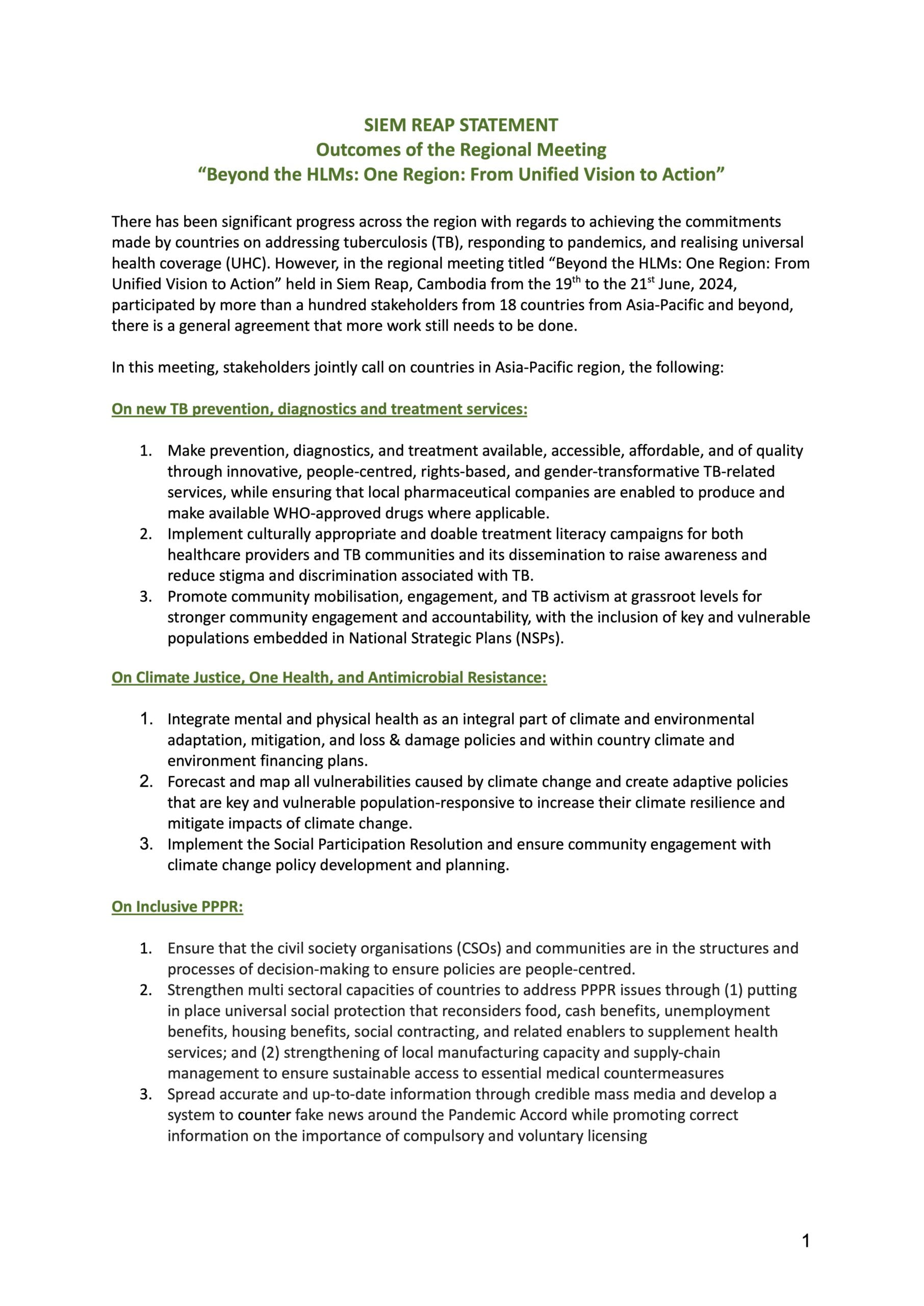SIEM REAP STATEMENT
Outcomes of the Regional Meeting
“Beyond the HLMs: One Region: From Unified Vision to Action”
There has been significant progress across the region with regards to achieving the commitments made by countries on addressing tuberculosis (TB), responding to pandemics, and realising universal health coverage (UHC). However, in the regional meeting titled “Beyond the HLMs: One Region: From Unified Vision to Action” held in Siem Reap, Cambodia from the 19th to the 21st June, 2024, participated by more than a hundred stakeholders from 18 countries from Asia-Pacific and beyond, there is a general agreement that more work still needs to be done.
In this meeting, stakeholders jointly call on countries in Asia-Pacific region, the following:
On new TB prevention, diagnostics and treatment services:
- Make prevention, diagnostics, and treatment available, accessible, affordable, and of quality through innovative, people-centred, rights-based, and gender-transformative TB-related services, while ensuring that local pharmaceutical companies are enabled to produce and make available WHO-approved drugs where applicable.
- Implement culturally appropriate and doable treatment literacy campaigns for both healthcare providers and TB communities and its dissemination to raise awareness and reduce stigma and discrimination associated with TB.
- Promote community mobilisation, engagement, and TB activism at grassroot levels for stronger community engagement and accountability, with the inclusion of key and vulnerable populations embedded in National Strategic Plans (NSPs).
On Climate Justice, One Health, and Antimicrobial Resistance:
- Integrate mental and physical health as an integral part of climate and environmental adaptation, mitigation, and loss & damage policies and within country climate and environment financing plans.
- Forecast and map all vulnerabilities caused by climate change and create adaptive policies that are key and vulnerable population-responsive to increase their climate resilience and mitigate impacts of climate change.
- Implement the Social Participation Resolution and ensure community engagement with climate change policy development and planning.
On Inclusive PPPR:
- Ensure that the civil society organisations (CSOs) and communities are in the structures and processes of decision-making to ensure policies are people-centred.
- Strengthen multi sectoral capacities of countries to address PPPR issues through (1) putting in place universal social protection that reconsiders food, cash benefits, unemployment benefits, housing benefits, social contracting, and related enablers to supplement health services; and (2) strengthening of local manufacturing capacity and supply-chain management to ensure sustainable access to essential medical countermeasures
- Spread accurate and up-to-date information through credible mass media and develop a system to counter fake news around the Pandemic Accord while promoting correct information on the importance of compulsory and voluntary licensing
It was recognised in the meeting that UHC and social protection are two overarching issues that tackle access to new TB prevention, diagnostics, and treatment services. At the same time, there is an understanding on the need to expand the role of civil society and communities to include participation in disease and PPPR surveillance and community-led monitoring. However, this requires investment.
These calls for joint action will further pursue and expand our greater aspiration towards a people-centred, just, equitable, gender-transformative, civil society and community-inclusive, and accountable health responses for all – beyond TB, UHC, and PPPR.

